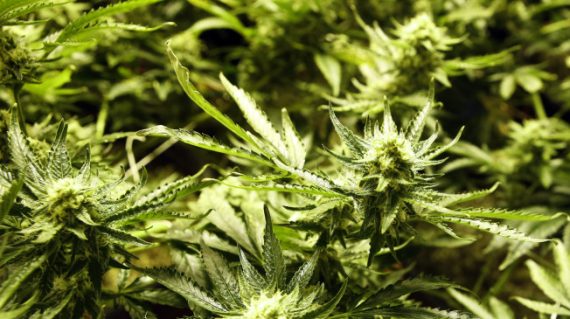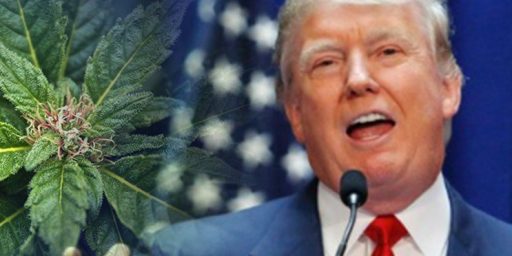House Votes To Protect States That Legalize Marijuana From Federal Raids
A victory for Federalism and sanity in the War On Drugs.
The House of Representatives voted on Thursday to give states that have legalized marijuana for medical use some protection from the Federal Government:
WASHINGTON — The House passed an amendment late Thursday night to restrict the Drug Enforcement Administration from targeting medical marijuana operations in states where it is legal.
The 219-189 decision came on a bipartisan appropriations amendment spearheaded by California Republican Rep. Dana Rohrabacher and California Democrat Sam Farr. The amendment still faces several procedural hurdles before it is ratified, but this is the first time such an amendment has succeeded in the House.
The vote is an encouraging one for marijuana advocates, who say it shows the congressional pendulum is finally tilting in their favor.
“The significance of it is a symbolic importance,” said Dan Riffle, director of federal policies at the Marijuana Policy Project. “We are nearing a point now where the United States Congress is essentially ready to end marijuana prohibition.”
The amendment needed 218 votes to pass.
The bipartisan amendment was co-sponsored by Republican Reps. Donald Young, Tom McClintock, Paul Broun, Steve Stockman, and Justin Amash along with Democratic Reps. Earl Blumenauer, Steve Cohen, Jared Polis, Barbara Lee, and Dina Titus.
Though the decision is a significant one, there are still many strong voices in opposition to marijuana reform, including those of GOP Reps. Andy Harris of Maryland and John Fleming of Louisiana.
“This would be like me as a physician saying, ‘I think you need penicillin. Go chew on some mold,'” Harris said while debating the amendment Thursday night.
Late Wednesday night, members debated a separate amendment from Fleming that caused tempers to flare on both sides.
“We saw ‘reefer madness’ in the ’30s, and it has come back to Congress here 80-some-odd years later,” Tennessee Democratic Rep. Steve Cohen said.
“Marijuana does not make people commit crime. It makes them overeat,” he added.
Activists say that while raids on legal marijuana facilities have slowed down recently, they haven’t stopped entirely, including at least one raid in Colorado in 2014. And prosecutions of nonviolent drug offenders continue as well.
When asked whether the amendment would actually stop raids of facilities in states where it is legal for them to operate, a Department of Justice spokeswoman sent BuzzFeed this statement: “The department is reviewing the amendments.”
In a piece posted at National Review prior to the vote, Congressman Rohrbacher argued that the Federal Government should let the states decide how to regulate marijuana, and stay out of the way when they choose to legalize it:
The “drug war,” while targeting far worse substances as well, is primarily about weed. It is, after all, an iron law of prohibition that markets for more dangerous poisons — think “bathtub gin” — develop when a less toxic one is banned.
As more states lift criminal penalties on marijuana, unreconstructed weed warriors step up their warnings of its many dangers. True as some of those warnings may be, what these holdouts ignore are the incalculable costs to our free society of continuing this long-lost war.
Those costs?
The explosion of gun violence across our urban landscape, now spreading to suburbs and the countryside; our unconscionable incarceration rates; the out-of-control and unconstitutional seizure of private property on drug enforcers’ whims; the corruption and militarization of our police; the chronic despair forced on minority Americans; a monumentally dysfunctional and alienating policy toward our Latin American neighbors; and even, yes, the subtle, psychological robbery of the self-worth and self-responsibility necessary to addressing drug-related problems realistically.
This is not a proper vision of government’s role, as the late William F. Buckley Jr. and Milton Friedman, among many others, taught my generation. We constitutionalists respected the Tenth Amendment’s preference for state laws, and we trusted the moral autonomy of the individual.
The drug cartels, which our laws unintentionally created, offer Plato o Plomo.Here’s the better bargain: End the weed war and watch as responsible and freeborn citizens find successful means to contain marijuana use creatively.
In the decade or so since reform of marijuana laws at the state and local level has become a trend, the tensions between states that want to liberalize their laws dealing with marijuana and a Federal Government intent on pursuing the War On Drugs. During the Bush Administration, this resulted in Federal agents raiding marijuana growers and medical marijuana dispensaries notwithstanding the fact that what the were doing was completely legal under the laws of California and other states that had legalized marijuana for medicinal use. When he ran for President, and when he first took office, President Obama promised to step back in pursuing such raids in states where marijuana laws had been liberalized. However, reality proved to be far different when raids ended up continuing and, when California voters seemed likely to pass referendum to legalize marijuana completely, Attorney General Eric Holder took the extraordinary step of interfering in a state election and said that Federal law enforcement would still pursue cases against California citizens related to marijuana. Despite that, the movement to liberalize marijuana laws continued, and reached new heights in 2012 when both Colorado and Washington voters approved referendums to legalize marijuana. Despite those votes, Federal raids continued in Colorado.
The bill that passed the House on Thursday would not end all of these Federal actions, but it would go a very long way toward doing so. It would also give the states far more leeway to liberalize their marijuana laws as they see fit, while also giving peace of mind to people in those states who might worry that they could end up charged with a Federal crime for doing something that is perfectly legal under the laws of their state.
It’s hard to see what could possibly be wrong with the changes in Federal drug policy that the House is proposing here. We’ve already seen poll after poll showing that a majority of Americans support the legalization of marijuana, and an even larger majority support legalization for medical use. All of the old arguments about the dangers of recreational marijuana use have been largely discredited, and at most we’ve learned that regular use is still less dangerous than someone who drinks excessively on a regular basis. In the meantime, countless states have legalized marijuana for medical purposes, while other jurisdictions have effectively decriminalized it to the point where it is the legal equivalent of receiving a traffic ticket. And, of course, two states have legalized it outright. There’s been no evidence to date of bad effects from these changes in the law. Shouldn’t the states be permitted to continue with these experiments free from the heavy hand of the Federal Government? If it turns out that it works, then more states will likely go down the same road, and Washington will find itself at the point where it is alone in the drug war, at least when it comes to marijuana.
I’ve seen no word on what fate this bill might face in the Senate, or what position the Obama Administration takes on the matter. One hopes they’d support it and this would be passed into law quickly. However, given the general attitude about the War On Drugs that still exists inside the Federal Government, I’m not entirely optimistic about that happening. Nonetheless, we owe some thanks to the 49 Republicans and 170 Democrats who voted in favor of Congressman Rohrbacher’s Amendment. It is a good first step.






Dicey odds in the Senate, and even dicier on the President’s desk. It may take the next President to do what is actually needed today: change the classification of marijuana. The executive retains the power to do this unilaterally.
When I saw the headline, I was pleasantly surprised, thinking that House Republicans, those self-proclaimed staunch defenders of personal freedom, small government, and states rights, were finally going to take a stand, however small, against the war on drugs. Turns out, the vast majority of House Republicans couldn’t even vote for a limited, largely symbolic, amendment like this one. How pathetic, and totally expected.
The text of the amendment and some additional analysis is at:
http://lawprofessors.typepad.com/marijuana_law/2014/05/house-votes-to-block-the-doj-from-spending-money-on-medical-marijuana-investigations.html
So… this bill has been passed by the Republican-controlled House. It now has to pass through the Democrat-controlled Senate and signed by the Democrat president. If it doesn’t become law, it’s entirely on the Democrats.
Unless 40 Republican Senators in the Senate threaten a filibuster, but the Democrats just need to peel off six Republicans to handle that possible obstacle.
@Jenos Idanian #13: So according to baby Jenos, if the Republicans choose to filibuster this, it’s really the Democrats fault because they didn’t use their magic powers to stop the Republicans from being their usual scummy selves.
@wr: Jesus H. Christ. Are you so effing STUPID you don’t understand the word “unless,” or so effing dishonest?
My money’s on “both.”
@Jenos Idanian #13:
That unless is it’s most likely stumbling block, but we shall see.
Why would the feds raid legal marijuana grow ops? Even if the legality is unclear isn’t it a waste of public funds vs busting harder drugs? Is marijuana illegal under federal law while legal under state law and if so, why hasn’t a court decided which takes precedence yet? As a practical issue does this discourage retailers from openly licensing and operating in Colorado/Washington?
@Grewgills: Thank you for your tacit support. I realize your tribalism keeps you from openly calling out wr on his idiocy, but I appreciate that you went even as far as you did.
@Jenos Idanian #13:
Thank you for the insult with your thank you, I guess your tribalism won’t let you reply to someone you perceive to be in a different camp without an insult.
the whole thing about weed is to legalize it’s cultivation. try growing a tobacco plant in your back yard, the atf will not be pleased in the least. if they turn weed into the same thing then why even bother, it’s more of the same.
legal weed shouldn’t have a massive impact on our society, employers can still have “drug free” work places (just like you can’t come to work drunk) and require drug screening as they see fit. i can’t see many employers still being anti-weed in initial drug screening (my company excluded) but if there’s an injury on the job they will drug test and terminate if they need to.
there’s always responsibility on the user, as there always should be.
@bill:
I agree with your larger point, but am not sure where you get the not growing tobacco in your back yard part. I know several people that grow their own tobacco and roll their own cigars.
@Grewgills: i mean you can’t sell what you grow, my bad!!